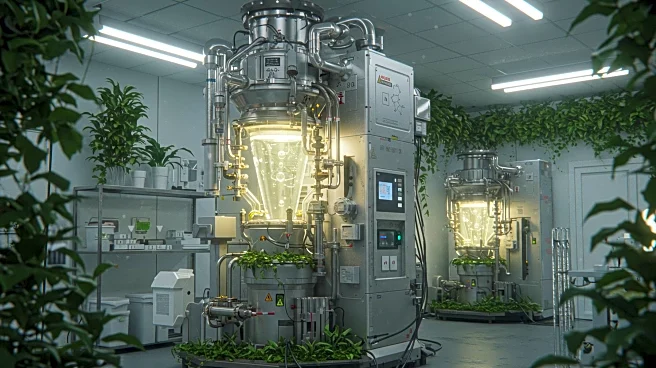What's Happening?
Sana Biotechnology has decided to halt the expansion of its manufacturing facility in Bothell, Washington, opting instead to utilize third-party contract development and manufacturing organizations (CDMOs) for its production needs. This decision was announced in the company's second-quarter financial results, which revealed a non-cash impairment charge of $44.6 million, contributing to a net loss of $93.6 million. The Bothell site, initially intended to be an 80,000-square-foot facility, was part of a strategic shift from Fremont, California, aimed at saving $100 million over three years. Despite raising $588 million in its initial public offering in 2021, Sana has faced challenges, including staff reductions and product development cuts. However, the company has reported progress in its type 1 diabetes treatment, UP421, showing promising results in recent trials.
Why It's Important?
The decision to pivot to CDMOs reflects broader trends in the biotech industry, where companies are increasingly relying on external partners to manage production costs and capacity. This move could impact the local economy in Bothell, Washington, where the facility was expected to create jobs and stimulate economic activity. For Sana, leveraging CDMOs may provide flexibility and reduce overhead costs, allowing the company to focus resources on advancing its therapeutic pipeline. The financial loss underscores the volatility and high-risk nature of biotech ventures, particularly for companies in the early stages of product development. Stakeholders, including investors and employees, may face uncertainty as the company navigates these strategic shifts.
What's Next?
Sana plans to explore subleasing opportunities for the Bothell site and its lab and office space in Seattle, potentially mitigating some financial losses. The company will continue to focus on its promising diabetes treatment, UP421, which could become a significant revenue driver if successful. The biotech industry will be watching Sana's next moves closely, as its strategy could influence other companies facing similar challenges. Investors and analysts will likely scrutinize Sana's financial health and strategic decisions in upcoming quarters, assessing the long-term viability of its business model.
Beyond the Headlines
Sana's decision to halt its plant expansion raises questions about the sustainability of in-house manufacturing in the biotech sector, where rapid technological advancements and fluctuating market demands can make large-scale investments risky. The reliance on CDMOs may also reflect a shift towards more collaborative and flexible production models, which could become increasingly common as companies seek to balance innovation with cost management. Additionally, the company's focus on diabetes treatment highlights the growing importance of addressing chronic diseases, which continue to be a major public health challenge.










